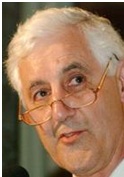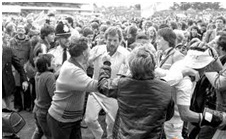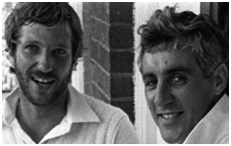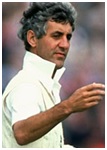|
 |
|
 |
Mike Brearley Leadership
Successful England cricket captain (inspiring a remarkable victory over Australia in 1981) Brearley (pictured right) is author of one of the best books on sports leadership, The Art of Captaincy (1985).
Why was he a great leader? 1. Intellect He learned what motivated people from his Cambridge University degree and his training as a psychotherapist. The Australian cricketer, Rodney Hogg (pictured right), said he was a great captain, because he had a “degree in people”.
2. Inspiration He led by example and got the best from his team by boosting their confidence and self-esteem, particularly England’s star player, Ian Botham , who beat Australia almost singlehandedly in 1981. Before England’s miraculous victory at Headingley (Leeds), Brearley told Botham (pictured right after the game): “I think you’ll get 150 runs and take 10 wickets”. In fact, he got 199 runs and seven wickets! “Everyone wants to do well for him”, Botham said about Brearley. But Brearley says charisma isn't as useful as other leadership qualities like “steadiness, patience, concentration, or considerateness”.
3. Mutual trust and respect His team returned his total confidence and respect for them. He nurtured them as unique individuals by:
4. Tough love Brearley’s leadership was a mixture of supportive sensitivity and toughness (ruthlessly disciplining and cajoling people). At Headingley in 1981, he spurred on Ian Botham (pictured right together after the game) by replacing him after a mediocre three over spell and calling him the ‘Sidestep Queen’ for an exaggerated bowling step that was reducing his accuracy. But Brearley knew that every player was different and some needed more encouragement than others. To objectively assess each person’s needs, he stepped back from the team and was never ‘one of the boys’.
5. Creative involvement He encouraged ideas and advice from his players (e.g. in team meetings), even though he didn’t always accept them. This involvement (what he called a “democracy of ideas”) united the team and found creative solutions to their problems. “It is the captain's job to find a balance between discipline and creativity”, says Brearley.
6. Change, flexibility and planning He changed his tactics according to the situation – weather, pitch, time available and the strengths and weaknesses of his team and the opposition. So he likened a leader to a conductor of an orchestra who “determines the attitude of the players and the team as a whole to each situation”. He was also constantly choosing between alternatives and planning ahead.
7. Continuous learning He had enormous cricket knowledge, inspired by his cricketing father. But he never stopped learning about the game or his players. So he always watched a match when his team were batting. This also communicated his concern for their performance and increased his identity with them.
8. Communication He communicated clearly and decisively to his players, using regular eye contact. In the 1981 Headingley match (when Australia needed only 131 to win in their second innings), he boosted his players’ confidence by saying “They’re the ones who are nervous now. On this pitch, a side could be bowled out for 90”.
9. Determination and intuition Brearley (pictured right captaining England) was determined to win (never giving up and always ramming home an advantage) and followed his intuition (even though it was wrong sometimes!).
10. Fun with responsibility Brearley made it clear that every player was responsible for his own, and the team’s, success. But he believed this duty should never stop them having fun and a joke.
Key quotes on leadership You have to reply to criticism with your intellect, not your ego. A captain must get the best out of his team by helping them to play together without suppressing flair and uniqueness. Ultimately it is by example that he [the captain] earns, or fails to earn, the respect of the team. Some players need more carrot than whip. A good leader or manager is interested in what makes people tick, particularly when they seem to be difficult or withdrawn or under-achieving. A captain must instil the will to win.
Key quote on teams Team success is, indeed, the product of personal successes. The most reliable way of improving a team is to improve its talent. |
|
|
||
|
|
|
||
|
||
| Copyright © wisdomtowin.com All Rights Reserved | ||
|

 Mike Brearley (1942- )
Mike Brearley (1942- )



